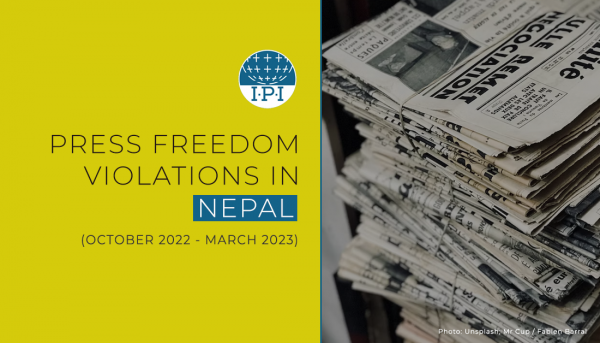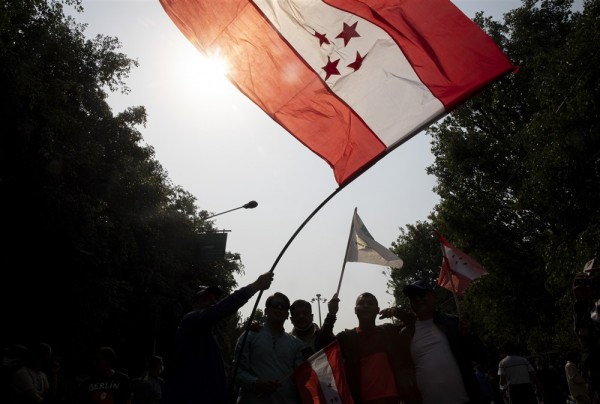The International Press Freedom and Freedom of Expression Mission to Nepal congratulates Nepali journalists for their coverage of the campaign and the historic election held on 10 April. Their scrutiny of the process and coverage was one critical factor contributing to a mostly peaceful election day. The Mission also congratulates its partner, the Federation of Nepali Journalists, for providing the leadership in creating a climate conducive for media work throughout the process.
The following is the joint statement of the FNJ and the International Mission:
While congratulating the role of Nepali journalists for their coverage of the electoral process, we are deeply concerned about the frequent violations of media freedom and freedom of expression that occurred in the run-up and during the process, particularly in the campaign period.
We emphasize the need for continued vigilance on issues of media freedom in the ongoing vote count, the formation of the new government and during the constitution-writing process in the newly-elected Constituent Assembly. The FNJ and International Mission recommend that these issues be recognised by all stakeholders and observers committed to facilitating a successful democratic transition in Nepal.
From 1 January 2008, the FNJ monitored media safety violations and attempts to restrict the free flow of information through its local chapters in 70 of 75 districts. Starting 8 April, three joint FNJ- International Mission teams were in the field for monitoring, to provide assistance and for rapid response in three of Nepal’s five development regions. On election day, the FNJ deployed four regional monitoring teams and had a rapid reaction team on standby in Kathmandu for dealing with serious violations.
The campaign period was marked by 61 instances of violations of media rights, including access to information and attacks on journalists. The FNJ identified:
• 20 cases of physical attacks
• 12 cases of threats and intimidation
• 21 cases of violations of freedom of information
• 8 cases of attacks on media houses or media vehicles
Particular incidents that restricted the free flow of information in the campaign and election period, highlighted by the FNJ and International Mission, include the following:
• Bandhs or localised general strikes particularly in the southern Madhesh areas which limited physical movement, and threatened journalists and citizen safety;
• Localised difficulties in obtaining press and vehicle passes restricted access for several journalists, limiting their capacity to report;
• One localised incident involving seizure of journalist documentation; and
• One localised incident in which security and administration officials refused to divulge crucial information on the killings that took place in Dang on April 09, when that information was urgently required in the public interest.
It is regrettable that some political parties and their supporters tried to restrict the flow of information and threatened the well-being of journalists during the campaign. Such behaviour could threaten Nepal’s transition to democracy and peace in the post-election period. However, we commend the political parties for their moderation on election day.
Although Nepal’s media has made a strong positive contribution to the election process, we also emphasise the fact that many long-term structural issues continue to limit the potential of the media’s role. These include a lack of broad-based skills development in many areas; intimidation and threats creating insecure environments and encouraging self-censorship in some locations; and a lack of regulatory reform guaranteeing freedom of expression and public service media, including the reform of the state media. The FNJ and the International Mission urge all national and international civil society and government stakeholders to pay close attention to these requirements. This includes the urgent need for the upcoming new government and the Constituent Assembly to prioritise freedom and freedom of expression issues in their respective deliberations.
The FNJ and International Mission mandate focuses on media freedom and media safety issues during the election process. However it is self-evident that the quality of media election coverage during this process also requires detailed informed debate and review. We call on the Election Commission and the Press Council to release the results of their comprehensive election media monitoring project because of both overwhelming public interest and to inform media development initiatives in particular.
The FNJ and International Mission congratulate the people of Nepal on their successful and courageous participation in the vote. We also call on all political parties to ensure that the next steps in the political process are open, democratic and transparent.
The FNJ and International Mission will issue a full report on the media monitoring project after the election process comes to an end.
The Federation of Nepalese Journalists is an association of some eight thousand journalists in Nepal.
The International Media Freedom Monitoring Mission is a collaboration of more than a dozen international media advocacy and media development organisations. The following organizations participated in the International Mission for the election:
• International Federation of Journalists (IFJ)
• International Media Support (IMS)
• International News Safety Institute (INSI)
• International Press Institute (IPI)
• Internews
• Reporters sans Frontičres (RSF)
For further information relating to this statement please contact:
Harold Ryan
International Media Support
Nřrregade 20, 2nd
1135 Copenhagen K
Denmark
Office: +45 8832 7010
Mobile : +45 2645 6563
E-mail: [email protected]


